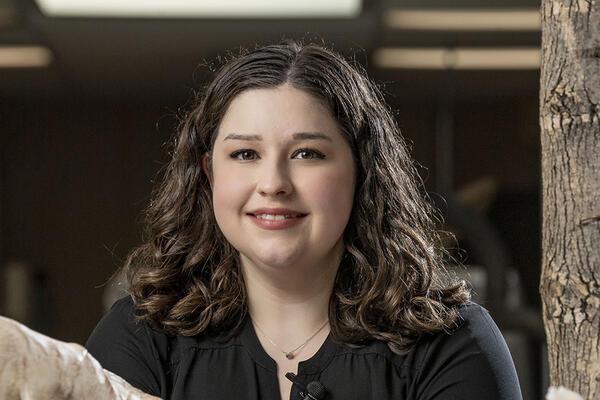On this page:
- Why Choose History?
- Careers
- Real-World Experience
- Success Stories
- Academics and Curriculum
- Admission
Why Choose History?
The Master of Arts program in history provides training if you intend to pursue a career as a professional historian, whether in teaching, research, or public history (archives and museum studies), as well as if you desire a strong historical background for other vocational or avocational objectives. The program offers opportunities for specialized study and research, but without neglecting the breadth that characterizes historical work at its best. In recognition of the fact that your interests and goals are varied, the program provides a choice of three concentrations, all of which lead to a Master of Arts degree. This program is approved by the Ohio Board of Regents.
You can choose from three programs of study leading to a master’s degree in history.
Thesis
You can finish the thesis program by completing a standard number of advanced courses, then preparing and defending a thesis based on primary source research. Choose a public history concentration.
Course Intensive
You can finish the course intensive program by completing two additional courses instead of the thesis. Choose a public history concentration.
Public History
You can finish the public history program through the standard advanced history coursework, but you will also gain hands-on experience and career preparation working in one of the many museums and archives in the Miami Valley area. Choose public history advanced coursework.
For more information, please contact Awad Halabi, Ph.D. at awad.halabi@wright.edu.
Careers
Graduates of the Thesis track generally pursue a Ph.D. in History at another university. This degree can lead to an academic position at a college or university, an administrative position at a professional organization, or a position as a historian for a corporation or organization.
Graduates of the Course Intensive track are often already employed in secondary education and find that this degree enhances their teaching abilities and employment options.
Graduates of the Public History concentration pursue careers in museums, historical societies, federal, state and local archives, state and federal park services, corporations, universities and public programs in history education.
Real-World Experience
You will have the opportunity to gain valuable experience through internships during your graduate work. Students also recently participated in a living history encampment to commemorate the centennial of a group of Daytonians preparing to fight in World War I. Some institutions that have hosted Wright State graduate interns recently include:
- National Museum of the United States Air Force
- Air Force Institute of Technology
- National Afro-American Museum and Cultural Center
- Boonshoft Museum of Discovery
- Garst Museum
- Clark County Historical Society
- Preble County Historical Society
- Armstrong Air and Space Museum
- Columbus Museum of Art
- Florida State Parks
- Foxfire (GA)
- Library of Congress
- National Park Service
- Ohio History Connection
- Penn Museum of Anthropology and Archeology (PA)
- Philmont Chase Ranch Museum (AZ)
- Wyoming State Parks
Success Stories
Academics and Curriculum
View the Master of Arts in History program information and requirements in the Academic Catalog.
Public History
If you are a graduate student primarily interested in a career in archival administration and/or museum management choose the public history option. Your studies culminate with a capstone project.
Thesis
The thesis track is intended primarily for you if you expect to continue graduate work beyond the master’s degree level or who need or desire the full range of professional experience, including intensive research and writing. It assures training in research techniques and the preparation of scholarly papers, culminating in the submission of a thesis.
You must meet all requirements of the Graduate School and show a reading knowledge of a foreign language when deemed necessary for thesis research as determined by their thesis advisor. You will take HST 7000 (Historical Methods). Near the end of your studies, and after submitting a prospectus approved by your thesis committee, you will register for 3-6 hours of HST 7950 (thesis). HST 7950 will conclude with an oral defense of the thesis before a panel of three professors, chaired by the thesis advisor.
Summary of Courses Required
- HST 7000: Historical Methods (3 credit hours)
- History Courses numbered 7000-7460: 12 credit hours (minimum)
- History Courses numbered 6000-6870: 12 credit hours
- History 7950: Thesis 3-6 credit hours
Total: 30-33 credit hours
Course Intensive
The course intensive track is intended primarily, but not exclusively, for you if you are not expecting to pursue doctoral studies. In lieu of a thesis, you will take two additional classes.
You must meet all the requirements of the Graduate School. Besides the required HST 7000 (Historical Methods), you will take four additional seminars and six other history graduate classes at the 6000 level.
Summary of Courses Required
- History Courses Numbered 7000-7460: 15 credit hours (minimum)
- History Courses Numbered 6000-6870: 18 credit hours
Total: 33 credit hours
Admission
New graduate students will be admitted in the Fall Semester of each year. Applications must be made online to the Wright State University Graduate School.
Graduate tuition scholarships are available, and all applications for this scholarship are considered. Apply for graduate assistantships during the spring semester of your first year.
In addition to fulfilling the Graduate School requirements, you must submit a statement of goals, three letters of recommendation, and a writing sample. These will also be uploaded electronically to the Graduate School.
- The one-page statement of goals should explain what draws you to graduate school and discusses your long-term career aspirations. Include the concentration, and track if applicable, you wish to pursue.
- The writing sample should be on an historical topic and include complete citations (the writing sample normally comes from an advanced undergraduate history course).
- Letters of recommendation should be solicited from those who can discuss your academic abilities in detail.
Please note that the history department does not require the Graduate Record Exam (GRE).
Please feel free to contact SOHCS with any additional questions.



